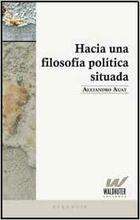Several decades ago we coined the category of the situated universal. It was not just the universal classic (abstract), nor a "concrete" universal (Hegelian), but rather a situated universality, which accepted the challenge of singularity and was - at the same time - capable of liberating it from particularity, of the accident and of any other condition.
This work proves the validity of that philosophical vocation. Not because it replicates previous positions, but because it creates philosophy, assuming and transforming a new Argentine and Latin American thought with its own style.
Auat had surprised us before with his work Sovereignty and communication and he does it again now with this attempt at situated political philosophy, in which Alberdi's traces are as clear as his dialogue with the most
current political debates. Thus Auat goes from Kusch to Habermas with t...read more
All book titles by this author
|
Title |
Price | ||
|---|---|---|---|
|
|
Hacia una filosofia politica situada Author: Alejandro Auat, Publisher: Waldhuter |
$450.00 |
Shopping cart
Loading cart
Important notices
|
|
Recordando a André Rouillé: Su legado en la fotografía André Rouillé 1948 - 2025 |
|
|
Libros de filosofía y co. Disponibles en Librería Herder |
|
|
Revista Filosofía & Co. nº 9 Nueva revista de filosofia divulgativa y actualidad |
|
|
"Espacios de la filosofía" - Mauricio Beuchot - Novedad Herder México |
|
|
Revista Filosofía & Co. nº 8 Nueva revista de filosofia divulgativa y actualidad |
Pay safely with:


In the webshop
New
|
|
La profecía en la antigüedad 70531 $900.00 -0.00% $900.00 |
|
|
Simone Weil y la cuestión judía 70530 $470.00 -0.00% $470.00 |
|
|
Medios calientes 70159 $400.00 -0.00% $400.00 |
|
|
El bestiario de Michel Foucault 70404 $749.00 -15.00% $636.65 |
|
|
Cantan los ángeles, rugen los monstruos 69202 $510.00 -0.00% $510.00 |
In the press
Promotions
|
|
Panorama A1.1, Deutsch als Fremdsprache Übungsbuch 36726 $235.00 -35.00% $152.75 |
|
|
Diccionario de términos filológicos 70241 $900.00 -25.00% $675.00 |
|
|
Verbos conjugados $600.00 -25.00% $450.00 |
|
|
Prosa y poesía. Homenaje a Gonzalo Sobeja 70242 $1,755.00 -25.00% $1,316.25 |
|
|
Lingüística española aplicada a la terapia del lenguaje 70239 $300.00 -25.00% $225.00 |





